House tackles crime-riddled DC
Fox News senior congressional correspondent Chad Pergram has the latest on the U.S. crime spike on 'Special Report.'
Politics is the art of the possible. House Republicans have taken on what’s "possible" during their short time in the majority — and appear to be letting the subjects which are not so possible drift by the wayside.
The "impossible?" An overarching bill that would truly secure the border, reform immigration and make it into law. A bill cutting trillions in spending to balance the budget. Or something on firearms.
So what remains is the "possible" for House Republicans? Taking on the city that conservatives utterly abhor: the nation’s capital, AKA "The Swamp."
HOUSE REPUBLICANS FIND THE SLOG OF GOVERNING IS HARD, AND BORES THE PRESS
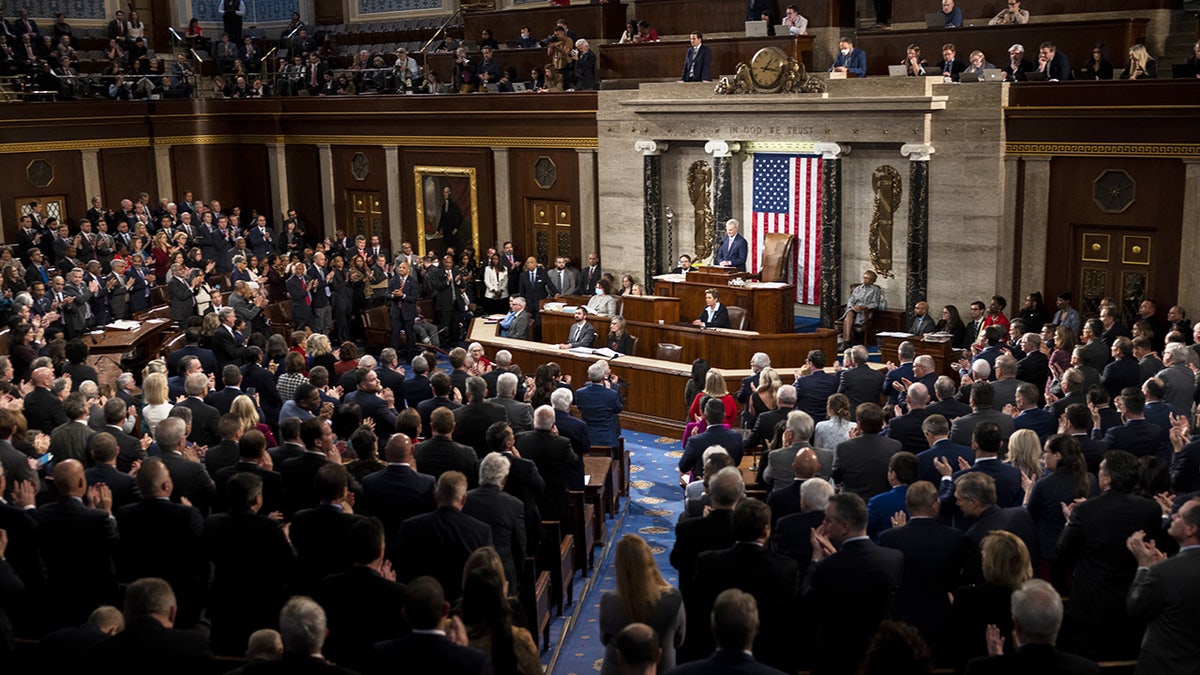
Speaker-elect Kevin McCarthy gives a speech before being sworn in, following Republicans winning the vote for speaker in Washington, DC on January 7th, 2022. (Nathan Posner/)
Halley’s Comet is predictable. It’s visible here on Earth every 76 years as it completes its circuit around the sun.
House Republicans are predictable, too. The GOP challenges local laws in Washington, D.C., every time they win control of the House.
This trend began in 1995 as the GOP won the House for the first time in four decades.
Former House Speaker Newt Gingrich, R-Ga., and the GOP made the District of Columbia a target back then.
HOUSE GOP DEMANDS ANSWERS FROM PENTAGON ON LEAKED RECORDS OF JENNIFER-RUTH GREEN'S SEXUAL ASSAULT
D.C. was a mess in the mid-1990s. Republicans considered relieving the nation’s capital of "home rule." The books were so bad the GOP wanted to pitch the city into receivership. Gingrich arranged a special team of House members to retrench the city’s economy. Tackle welfare, housing and crime. Another group would try to improve the schools.
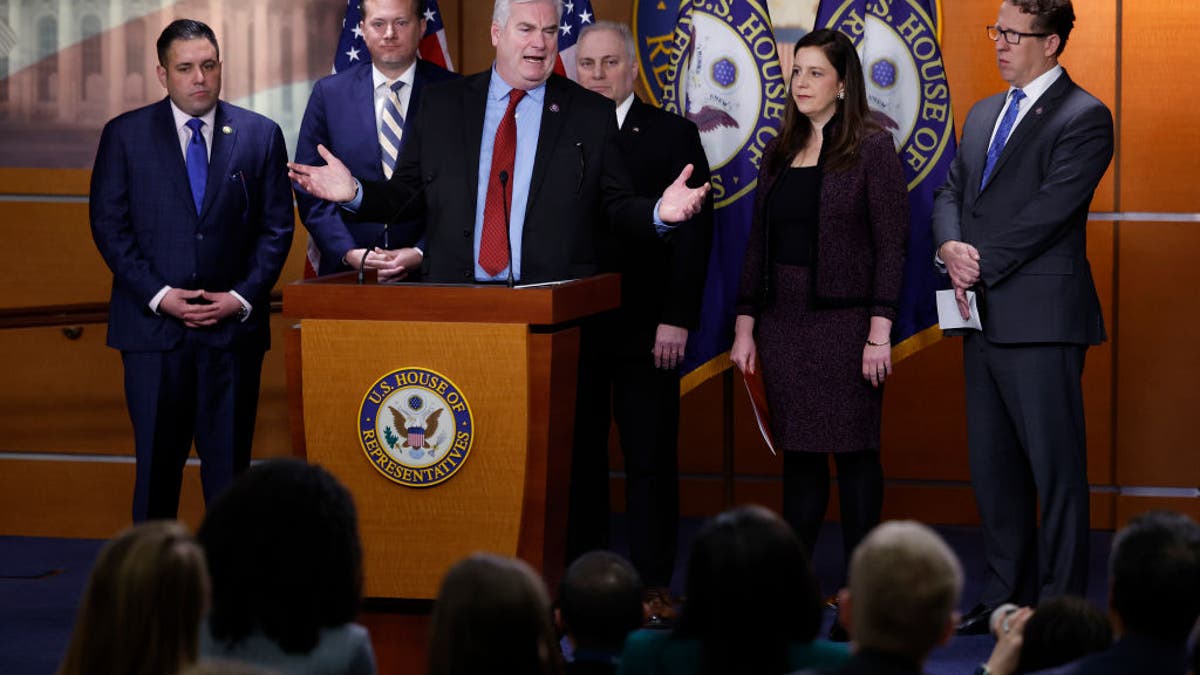
House Republicans passed their first bill of the 118th Congress in early January, voting along party lines to cut $71 billion from the Internal Revenue Service, which Senate Democrats said they would not take up. (Chip Somodevilla)
But late Washington, D.C., Mayor Marion Barry (D) and Del. Eleanor Holmes Norton, D-D.C., took issue with Republicans targeting their home turf. They questioned whether Republicans should challenge the city’s "home rule" provision. Congress always served as a super city council for the District of Columbia until the 1970s. That’s when Congress relented and granted the city "home rule." But Republicans tried to claw back local authority.
And so with Republicans again running the House, they are again taking on D.C. There are three reasons. First, issues with the District of Columbia resonate with the conservative base. Secondly, Republicans fundamentally disagree with most policies put forth by the Democratic city. And third, it’s because Republicans can.
As we say, politics is about what’s possible.
The House of Representatives recently adopted two resolutions to overturn local D.C. laws. The District of Columbia City Council approved a plan to allow any resident of the city for 30 days the opportunity to vote — regardless of immigration status. The House also voted to repeal an update to the city’s criminal code, which GOPers say is soft on crime.
Many Republicans would support repealing D.C.’s autonomy. That’s led Norton to suggest that there are ulterior motives behind the GOP’s maneuvers.

WASHINGTON, DC - NOVEMBER 17: Flanked by House Republicans, U.S. Rep. James Comer (R-KY) speaks during a news conference at the U.S. Capitol on November 17, 2022 in Washington, DC. House Republicans held a news conference to discuss "the Biden family's business dealings." (Photo by Alex Wong/Getty Images) (Alex Wong)
"[Republicans believe] D.C. residents, a majority of whom are Black and brown, are either unworthy or incapable of governing themselves," accused Norton. "This is a new level of hostility to the District of Columbia."
The floor debate pitted a conservative House against a liberal city.
"The D.C. City Council is empowering, empowering criminals at the expense of the public," argued Rep. Anthony D’Esposito, R-N.Y.
The vote to nix the new criminal code came as crime spikes in Washington, D.C. Homicide, sexual assault and car theft all up dramatically this calendar year.
"The D.C. City Council is so completely captured by the woke far left, they have responded to the crime wave with a new criminal code that — listen to this — reduces penalties even further," said Senate Minority Leader Mitch McConnell, R-Ky. "The good news on this front is that the United States Congress gets to have the final word over reckless local policies from the D.C. government."
"Washington, D.C., is one of the most dangerous cities in the United States of America," said Rep. Marjorie Taylor Greene, R-Ga.
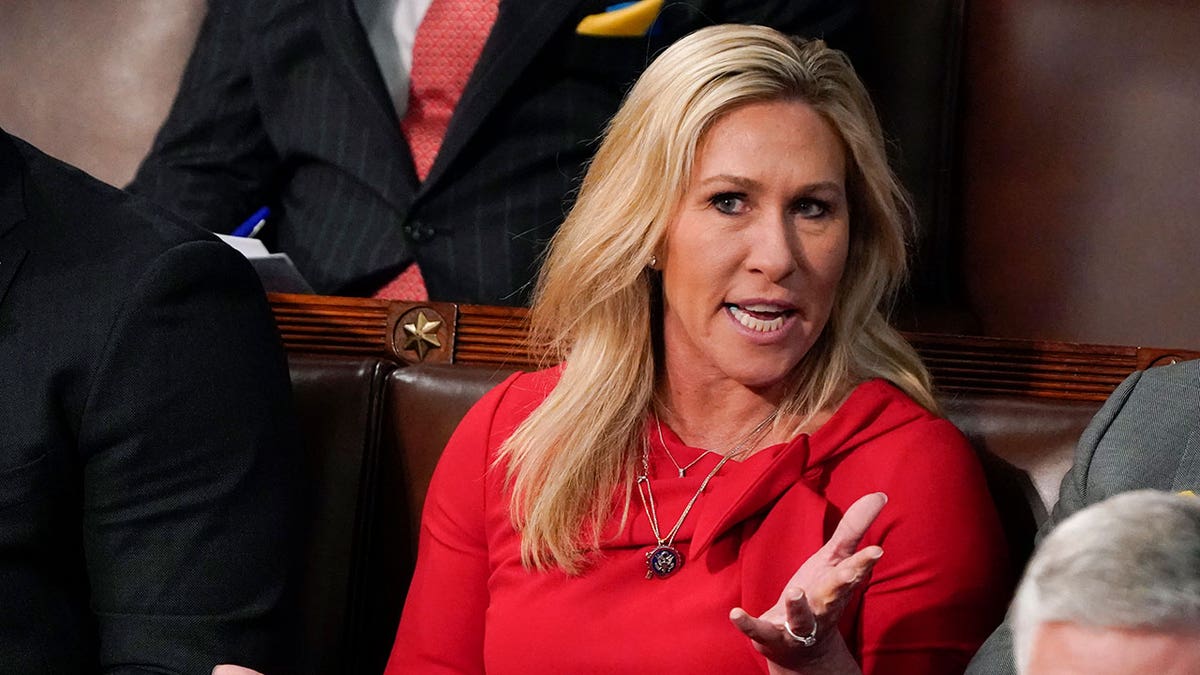
Rep. Marjorie Taylor Greene, R-Ga., talks as President Joe Biden delivers his first State of the Union address on March 1, 2022. (J. Scott Applewhite)
"It's dangerous. It's playing with the livelihoods of all who live or visit D.C.," said House Oversight Committee Chairman James Comer, R-Ky.
The House rebuked the city for allowing virtually anyone who lived in the city for a month to vote.
"Russian diplomats will get a vote. Chinese diplomats could get a vote," said House Speaker Kevin McCarthy, R-Calif.
Republicans have long railed against crime-riddled big cities controlled by Democrats. So, they were more than happy to take advantage of the opportunity to use Washington, D.C., as their municipal talking point.
Congress generally can’t do much about most local laws. But it can intervene in the affairs of the District of Columbia since the city is a special, federal enclave.
"Under the Constitution, Congress, not the city Council, has the final say over the laws governing the nation's capital," said McCarthy.
You can imagine how that went over with the D.C. locals.
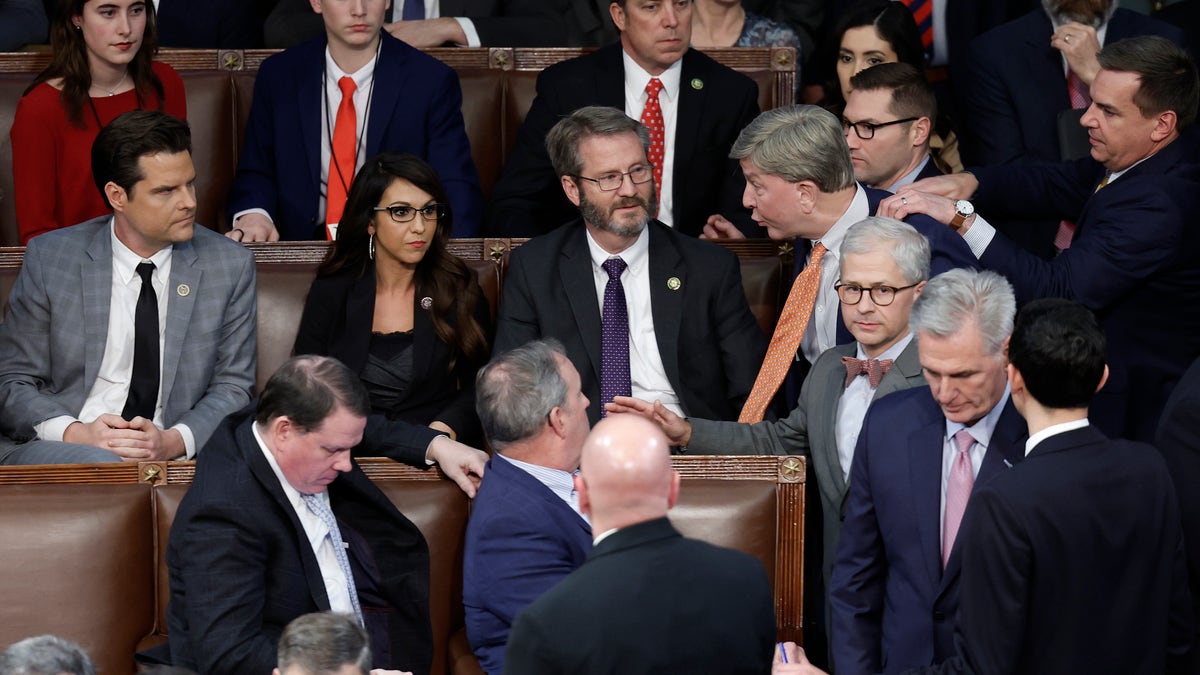
U.S. Rep.-elect Mike Rogers (R-AL) is restrained by Rep.-elect Richard Hudson (R-NC) after getting into an argument with Rep.-elect Matt Gaetz (R-FL) as House Republican Leader Kevin McCarthy (R-CA) walks away, in the House Chamber during the fourth day of elections for Speaker of the House. (Anna Moneymaker)
"I say to every member of Congress, keep your hands off D.C.," said Norton.
Rather than big-footing local control in Washington, Democrats offered Republicans an alternative.
HOUSE REPUBLICANS PRESS HUNTER BIDEN, JAMES BIDEN, ERIC SCHWEIN FOR BUSINESS DEAL DOCUMENTS
"If you want to micromanage the laws of Washington, D.C., then move to Washington, D.C., and run for the D.C. City Council," suggested Rep. Jamie Raskin, D-Md.
Democrats accused Republicans of interloping, especially since conservatives typically champion local control and aim to keep Congress out of community affairs.
"In direct contradiction of their quote unquote ‘conservative values of small government and defending freedom,’ [Republicans] have decided to expand the jurisdiction of this body to meddle in the business of D.C. residents," fumed Rep. Alexandria Ocasio-Cortez, D-N.Y. "The D.C. council has the right to determine its policies for D.C. residents."
But even that can be a struggle.
D.C. Mayor Muriel Bowser (D) vetoed the council’s overhaul of the criminal code. The council then overrode Bowser’s veto.
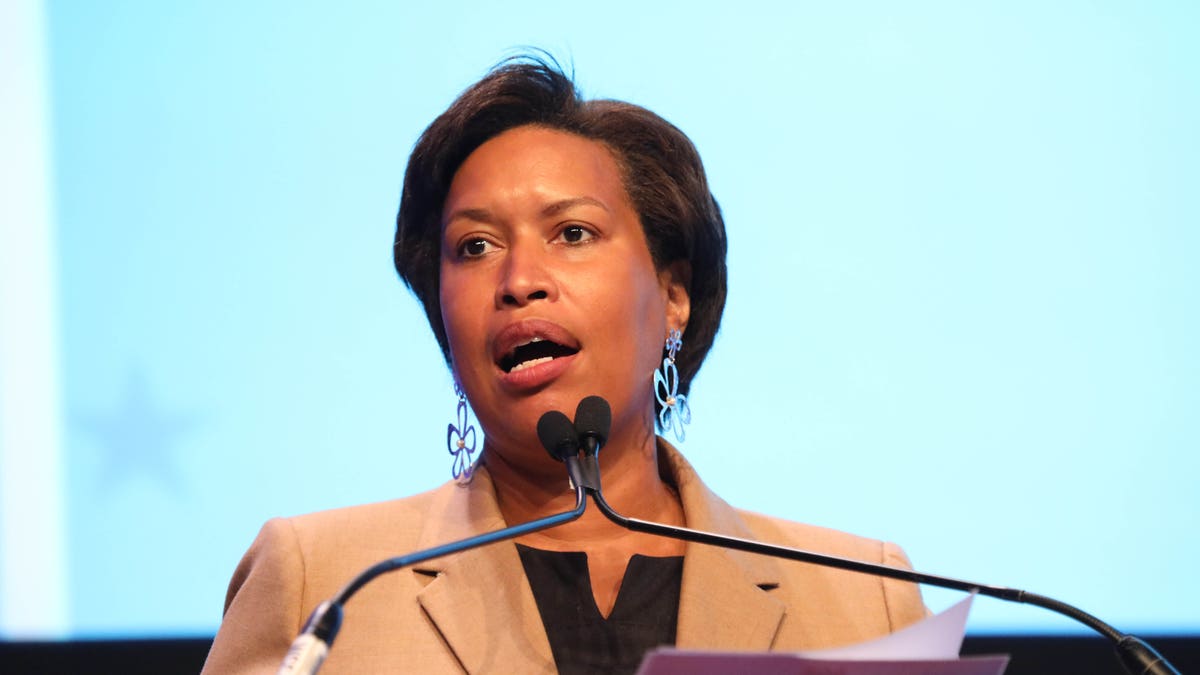
Washington, D.C., Mayor Muriel Bower (Brian Stukes)
But back to Capitol Hill.
Some Democrats sided with the GOP when it came to the administration of the nation’s capital.
On the morning of the House’s D.C. votes, a man assaulted Rep. Angie Craig, D-Minn., in the elevator of her Washington, D.C., apartment building. Craig is OK but suffered bruises. Craig and 31 Democrats then joined all Republicans voting to block implementation of D.C.’s revamped criminal code.
These resolutions will die in the Senate.
MINNESOTA REP. ANGIE CRAIG CREDITS MORNING COFFEE AFTER DC ELEVATOR ASSAULT: ‘REALLY SAVED THE DAY’
But in the House, it’s about the art of the possible.
The House doesn’t have a lot of legislative traffic right now. The D.C. resolutions were "possible."
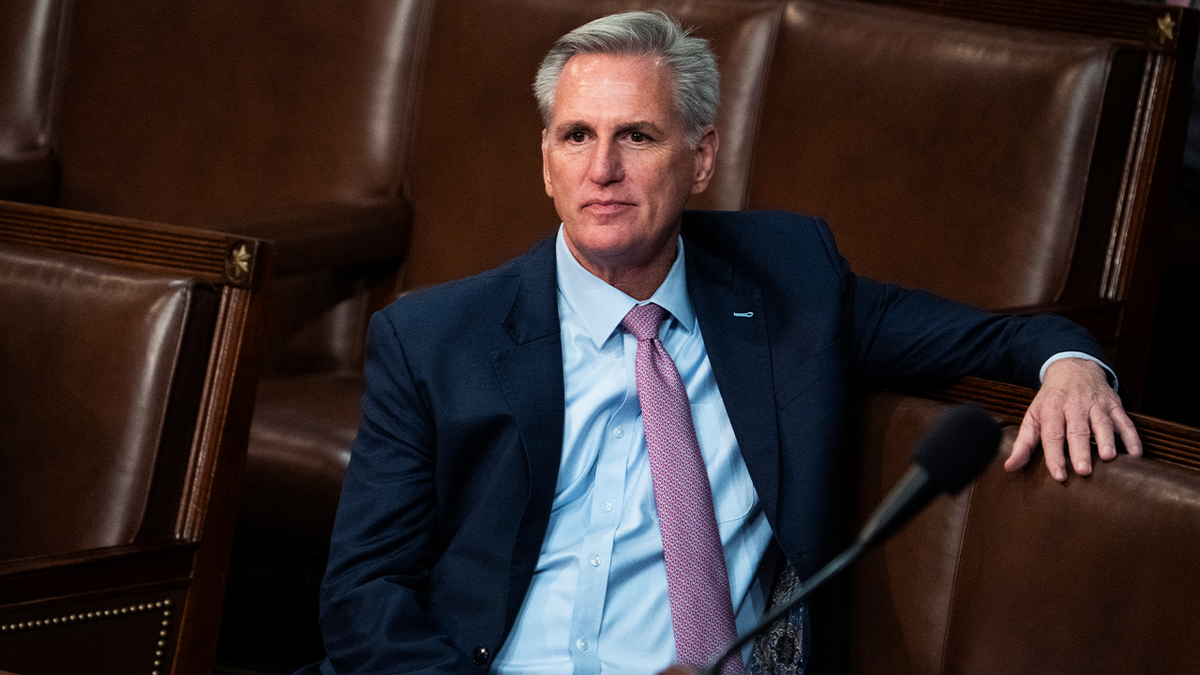
Rep. Kevin McCarthy was elected Speaker of the House for the 118th Congress. (Kent Nishimura)
A lot of other legislative issues weren’t. So, the House focused on D.C.
The Rules Committee met to prepare the parameters for debate on the measure on Monday, Feb. 6. Then the full House debated "the rule" the panel prepared on Tuesday, Feb. 7. The House debated one of the D.C. resolutions on Wednesday, Feb. 8. The House finished the week debating the other resolution and voting on both on Thursday, Feb. 9.
CLICK HERE TO GET THE FOX NEWS APP
The House frankly didn’t have many other measures on which to debate and vote on the floor. So, the House strung out the D.C. resolutions over the course of a week.
That’s all that was possible.






